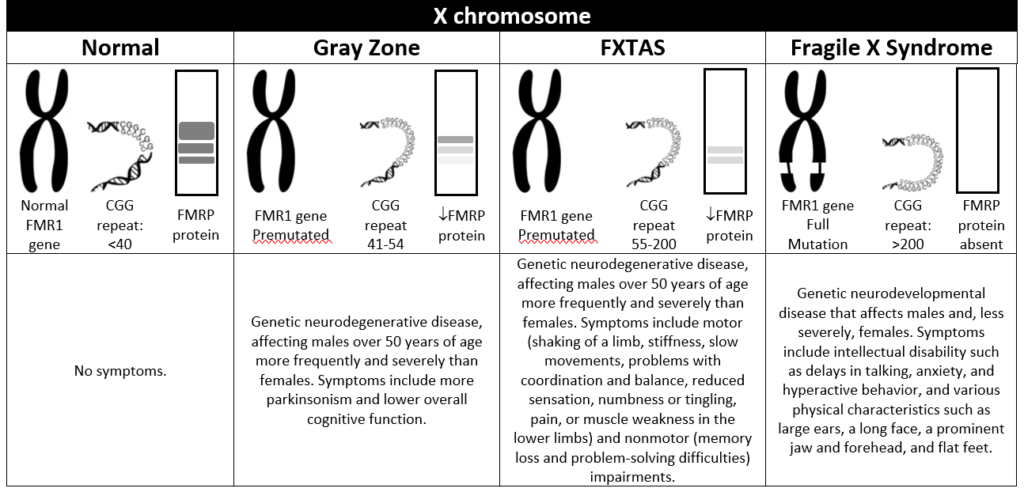Presented by Deborah Hall, MD, PhD
Summarized by: Dr. Michelle Tosin, a 2022 NFXF Jr. Investigator
Summary
As presented at the 18th International Fragile X Conference.
Fragile X-associated tremor/ataxia syndrome (FXTAS) is a neurodegenerative disorder related to the Fragile X premutation of the FMR1 gene on the X chromosome. The FMR1 gene premutation stimulates the repetition and expansion of DNA segments, called CGG. The longer the CGG repeat is in the DNA, the more Fragile the X chromosome becomes. A Fragile X chromosome produces less FMRP protein, which is an essential protein for brain development and function.

Figure 1 The different forms of Fragile X expansions and Fragile X-associated disorders.
Why This Matters
Recognizing the mechanisms involved and the symptoms related to each of the different forms of Fragile X expansions and Fragile X-associated conditions & disorders helps to understand the rationale used by clinicians to establish the diagnosis and, consequently, the therapy for each disease.
Created in 2011 and updated in 2018, the FXTAS Task Force and the Fragile X Clinical & Research Consortium established the FXTAS Diagnostic Criteria in Carriers of a FMR1 Premutation treatment recommendation, which involves the combination of radiological, clinical and/or neuropathological criteria.
When the diagnosis (definitive, probable, or possible) of FXTAS is established, the treatment will focus on the control of motor and non-motor symptoms. Treatment should be individualized and patient-centered and may involve the use of medications; psychological, family, and genetic counseling; rehabilitation; and even surgery.
Next Steps
With the establishment of the FXTAS diagnostic criteria and the successful management of the symptoms of this disease, the next steps are focused on finding a cure and/or reducing the FXTAS progression. This has created a critical need to standardize the assessment of FXTAS symptoms. Among the various initiatives and collaborations, this article highlights the ongoing “Fragile X-Associated Tremor Ataxia Syndrome Rating Scale (FXTAS-RS)” study. This study aims to develop and validate the first rating scale to assess the motor symptoms of FXTAS to, consequently, advance the field of early clinical trials targeting the detection of the natural progression of the disease over time and across multiple research sites.
about

Hilary Rosselot
Hilary joined the NFXF team in 2019. Prior to joining the NFXF team, she worked at the Cincinnati Fragile X Research and Treatment Center for over five years. She has experience as a clinical research coordinator across many types of clinical trials and served as the clinical research manager for the Cincinnati program. She earned a bachelor’s degree in psychology, a master’s, and is a SOCRA certified clinical research professional (CCRP). She enjoys time with family and friends, a great book, a strong cup of coffee and, of course, a good laugh!
learn more
Every conference year, the NFXF facilitates a Jr. Investigator program. You can learn more about the program and our 2022 Jr. Investigators here:
Brain & Behavior Study
Researchers at Purdue University are conducting a natural history research study to learn about brain activity in females, ages18-60 years, living with the FMR1 premutation.
Study: Mechanisms and biomarkers of disease progression in Fragile X-associated tremor/ataxia syndrome (FXTAS)
The University of Kansas BRAIN Lab is conducting a research study to learn about behavioral and brain differences associated with the Fragile X premutation. Males and females ages 50-80 living with the Fragile X premutation, with or without FXTAS, may be eligible to participate. The study includes remote & in-person visits at the University of Kansas.



